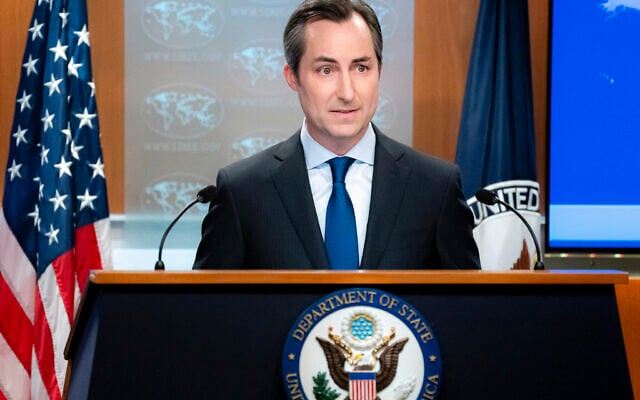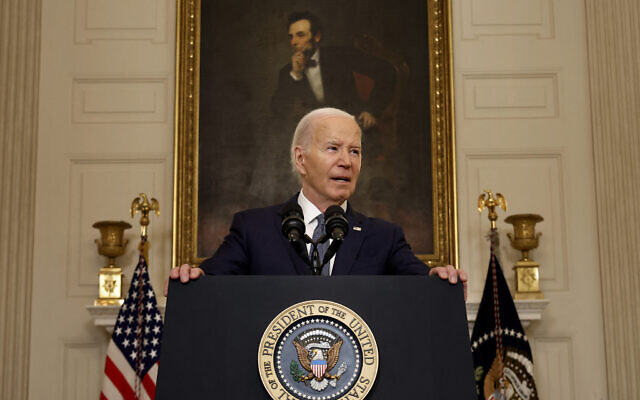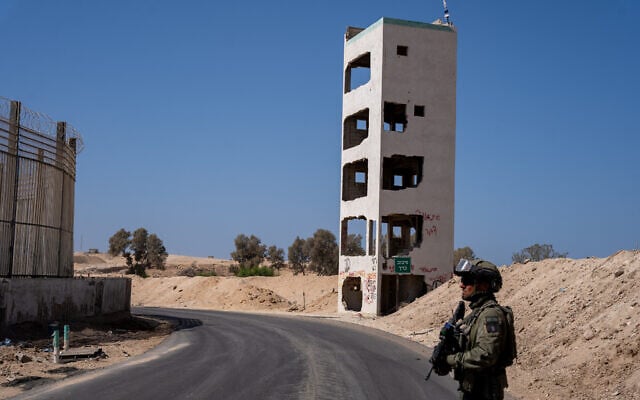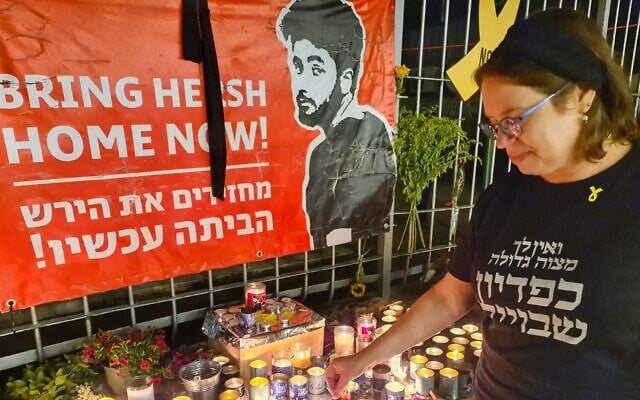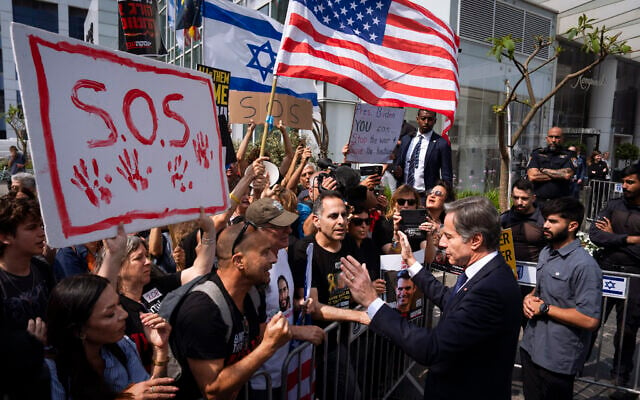


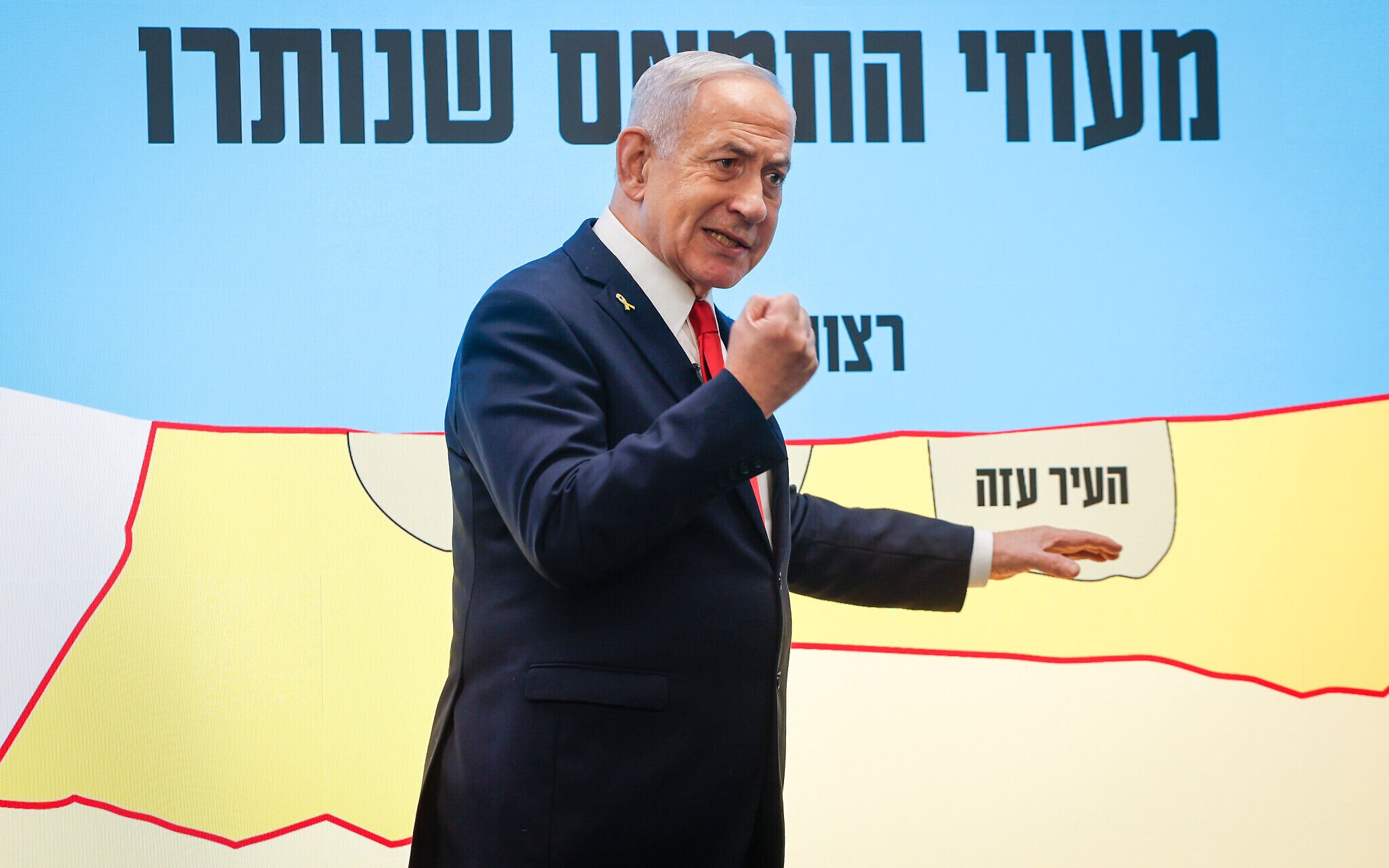
The Biden administration on several occasions wanted to publicly declare that Prime Minister Benjamin Netanyahu was hampering efforts to secure a Gaza ceasefire and hostage release agreement, but refrained from doing so upon understanding it would lead Hamas to harden its negotiating positions, a former senior US official revealed in an exposé that aired on Thursday.
“There were times that we very much wanted to go public and make clear that we thought the prime minister was being completely intransigent and making it tougher to get a deal,” former State Department spokesperson Matthew Miller, who was a close aide to former secretary of state Antony Blinken, told Channel 13’s “Hamakor” (“The Source”) TV program.
“But we discussed it amongst ourselves, and we made the decision that it wouldn’t accomplish anything [because] we had seen it in a number of cases, [former Hamas leader Yahya] Sinwar pulled back from negotiations when he thought there was division between the United States and Israel,” Miller continued. “We wanted to speak very toughly to the government of Israel behind closed doors, but ultimately not do anything that we thought would make it harder to get to a deal.”
Netanyahu has long been accused by critics within Israel and abroad of dragging out hostage negotiations since the early months of the war. But he has rejected those arguments by noting that US officials have repeatedly said publicly that Hamas was the main obstacle preventing deals from being reached.
Miller’s comments to Channel 13 offered some context for why that was the case, and the former Biden official recalled several instances when the US came close to calling out Netanyahu for allegedly torpedoing negotiations.
One example cited by Miller came in April 2024 as Israel was threatening to invade the Gaza Strip’s southern city of Rafah, which Netanyahu at the time was characterizing as Hamas’s final stronghold in the enclave.
Miller said the US had been pushing a six-week ceasefire and hostage release deal that still allowed Israel to resume the war afterward.
The former State Department spokesperson said the US was pressuring Hamas to accept the proposal, asserting that the terror group had good reason to comply, as doing so could potentially thwart Israel’s Rafah invasion, which Netanyahu had been delaying since February due to pressure from the administration not to launch the operation over Ramadan.
“But in the middle of that proposal being submitted to Hamas, the prime minister publicly said that Israel was going to invade Rafah, whether there was a ceasefire or not,” Miller said. “You can imagine how much harder that made it to get a deal over the line… [as it removed] the chief motivation [for Hamas] to agree to a deal.”
After months of authorizing what other Israeli hostage negotiators interviewed by “Hamakor” said was a very limited mandate, Netanyahu changed his approach completely in late May 2024, signing off on a proposal for the release of the remaining hostages in three phases that would culminate in an end to the war and a full Israeli withdrawal from Gaza.
We told the government of Israel only an hour or two before the speech because, frankly, we spent the last few months seeing the government of Israel, at times, try and sabotage an approach to get to a ceasefire, and we were determined not to let that happen here
Four days later, US President Joe Biden decided to give a speech revealing the key details of the proposal, fearing that Netanyahu would retreat from those terms.
“We told the government of Israel only an hour or two before the speech because, frankly, we spent the last few months seeing the government of Israel, at times, try and sabotage an approach to get to a ceasefire, and we were determined not to let that happen here,” Miller said, adding that the goal was to “box the prime minister in and made it very difficult for him to walk away from it.”
But in the hours and days after Biden’s speech, Netanyahu’s office began leaking messages to reporters suggesting the proposal laid out by the president was not the same as what the prime minister had agreed to.
“It is consistent with the pattern we saw for many months. They were always looking for ways to add conditions or make the terms more difficult,” Miller said.
After more than a month, on July 2, Hamas came back with a response that the mediators and Israel’s negotiating team felt was close enough to Jerusalem’s position to secure an agreement.
Israel then took almost the entire month to respond to Hamas’s offer. “We got bogged down in other issues [and] the government of Israel came back with its insistence on keeping troops in the Philadelphi Corridor,” Miller said, referring to the Gaza-Egypt frontier.
Israel’s proposal from May didn’t include a demand to keep Israeli troops along the Philadelphi Corridor, and while Israel’s security establishment didn’t state that it was essential, Netanyahu began arguing in July that a withdrawal from the border could allow Hamas to smuggle weapons in from Egypt and even hostages out from Gaza.
“That maybe was the most frustrating of all, because we were so close to getting a deal that could have certainly brought hostages home and maybe ended the war once and for all,” Miller said.
Then-defense minister Yoav Gallant reportedly tried to persuade Netanyahu and the rest of the cabinet that the IDF could quickly retake the Philadelphi Corridor if needed, and that securing the release of the hostages who may not survive much longer was more essential, but he was overruled and the government voted in favor of a decision advanced by the premier for Israel to remain along the border.
“It [was] our best chance to get a deal. Hamas, for the first time, was feeling pressured to agree,” Miller said. “We were really close to a deal, and the prime minister added these new conditions.”
Undeterred, the US then presented a proposal in August 2024 aimed at bridging the differences between the sides. It allowed for Israel to remain in the Philadelphi Corridor for a longer period of time before it would be required to gradually withdraw. Netanyahu agreed to the proposal.
“But somehow it managed to leak that he told the families of hostages that Israel would never withdraw from Philadelphi, which, of course, was a complete contradiction of the position that he had taken,” Miller said.
“We spent… an enormous amount of time trying to get this ceasefire over the line, and when anyone said anything or did anything that made it more difficult, it was incredibly frustrating,” he added.
At the end of that month, as talks continued to drag on, Israeli soldiers unknowingly approached a tunnel where six hostages, including American-Israeli Hersh Goldberg Polin, were being held in Rafah. Their captors executed them and their bodies were uncovered by Israeli troops shortly thereafter.
“That was such a horrible day to read about what they had gone through. We had met with Hersh’s parents and heard from his mom about his bravery on October 7, and it never, never left me,” Miller said, tearing up, as he recalled how Hersh had lost his arm in a grenade attack in the roadside bomb shelter before being kidnapped.
“It was heartbreaking, both for the tragedy itself, but it also really hurt because we thought we could have had a deal earlier, and a deal that would have saved those hostages, and we weren’t able to get it.”
By then, Israel had shifted its focus to neutralizing the threat from Hezbollah in Lebanon, and advanced hostage talks didn’t pick up again until December after the US brokered a ceasefire in the north.
White House Mideast czar Brett McGurk worked closely with then-incoming president Donald Trump’s special envoy Steve Witkoff to bring the deal over the finish line, with the latter leaning on Netanyahu to agree to the deal during a critical Jerusalem meeting on January 11.
Thirty-eight hostages — which included eight bodies — were released over the ensuing six weeks, during which Israel and Hamas were supposed to begin negotiating the terms of the permanent ceasefire that was supposed to come afterward.
But Netanyahu largely avoided holding those talks and ordered the resumption of fighting in March, which has continued to date.
By then, Trump was back in the White House, and Witkoff accepted Israel’s stated aversion to moving from the temporary truce phase of the deal into the permanent ceasefire phase. Instead, he pushed Hamas to accept a new proposal that again envisioned the sides agreeing to a temporary truce that could turn permanent if terms for ending the war were agreed upon.
“The Trump administration didn’t really pressure the government of Israel to stick to the terms of the agreement and let the prime minister resume the war without any serious effort at trying to bring it to an end,” Miller said.
McGurk, who also spoke with “Hamakor,” said he knew Israel would not be interested in phase two of the January deal after seeing the “grotesque” hostage release ceremonies that Hamas put on during the first phase, which were meant to show that the terror group was still the dominant force in the Strip.
Asked whether he thought the US wanted a hostage deal more than Israel, Miller responded, “I believe that is true.”
“Did they always prioritize the hostage negotiation above everything else? Probably not,” McGurk told Hamakor.
“But was there a time in which we had a ‘yes’ from Hamas on a full hostage deal, and we presented it to Israel, and Israel then added additional conditions? That just didn’t happen,” he clarified.
“Hamakor” anchor Raviv Drucker maintained that Israel took steps to ensure that Hamas wouldn’t agree to a deal.
Gallant told Hamakor that he opposed any negotiations with Hamas in the immediate aftermath of October 7, as he felt Israel needed to respond strongly to the attack.
While Hamas may have been interested in a deal initially, he felt that the terror group would come back to the table begging for a ceasefire and still willing to release some of the hostages after Israel dealt a decisive blow to the terror group in the battlefield.
Moreover, there was a broader feeling among leadership, which Netanyahu has held to this day, that stopping the war would leave Hamas in power and able to regroup.
Druker pointed to a first instance in October 2023, when Hamas informed Qatari mediators that it was prepared to release hostages shortly after the terror group’s invasion of Israel, during which it massacred some 1,200 people and took 251 more hostage.
Miller said Qatar sought to reach Israel in order to discuss a potential hostage release deal, but Jerusalem wasn’t interested at the time, as the trauma of October 7 was still fresh and Israel was prioritizing hitting back against Hamas over returning the hostages.
In November 2023, after Hamas refused to release the remaining female hostages as required in the deal, Israel rejected the terror group’s offer to release elderly and wounded hostages and the ceasefire collapsed, former war cabinet minister Gadi Eisenkot told Hamakor.
Hamakor then revealed two more extended delays in negotiations from January to March of 2024, when Israel began insisting on remaining in the Netzarim Corridor that bisects northern and southern Gaza — a demand it eventually withdrew in the deal it accepted a year later.
Drucker then pointed to Hamakor’s revelations of two more delays in talks in April 2024, as Israel prepared to enter Rafah.
He also recalled Israel’s added conditions regarding the Philadelphi Corridor in July 2024, which came before Hamas had given its final response, but still led talks to drag out significantly.
An additional Netanyahu-induced delay took place in early November 2024, when then-Shin Bet director Ronen Bar succeeded in crafting a breakthrough proposal that the prime minister told him to shelve in order to “wait for Trump,” Hamakor reported.
The broadcast ended with Miller recalling remarks Blinken made toward the beginning of the war as he sat in on an Israeli war cabinet meeting.
“The secretary was laying out all of our concerns to the prime minister and to the rest of the war cabinet. And he said, without a plan for the day after the conflict, you are going to be dealing with an insurgency in Gaza forever,” Miller said.
“You have continued instability in the West Bank. You are making it impossible to realize the dream that the State of Israel has had since its founding [normalization with Israel’s Arab neighbors]. You’re going to be bogged down here fighting this war for years and decades to come,” Miller added, recounting Blinken’s remarks.
“And the prime minister said, ‘You’re right. We are going to be fighting this war for decades to come. That’s the way it’s been. That’s the way it’s going to be,'” Miller recalled, apparently suggesting that the premier knew from the get-go that he was directing Israel toward an entrenched war in Gaza, and seemingly accepting it as a foregone conclusion.
Netanyahu’s office did not respond to the Hamakor report.

